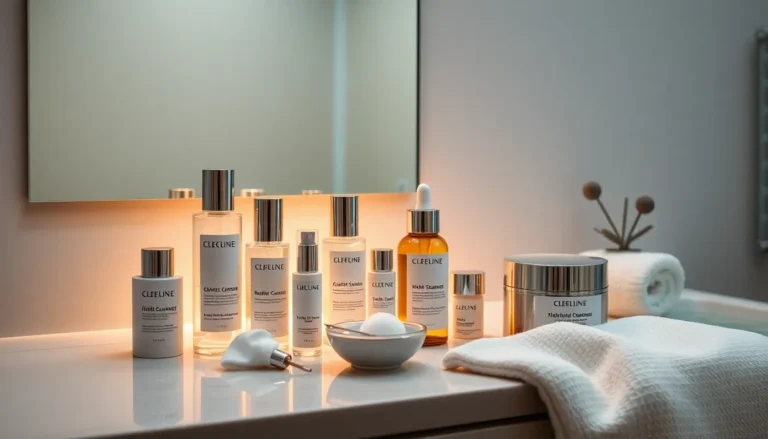Table of Contents
ToggleWhen it comes to skincare, navigating the vast sea of options can feel like trying to pick the best avocado at the grocery store, confusing and slightly overwhelming. But fear not. This comprehensive guide on facial care will not only clarify your skincare dilemmas but also make you smile. After all, the secret to glowing skin might just be a good laugh. From understanding your skin type to uncovering the must-have ingredients, this guide has got you covered. Let’s jump into the world of facial care and help your skin achieve its utmost potential.
Understanding Facial Skin Types

Identifying Your Skin Type
Knowing your skin type is the cornerstone of an effective facial care routine. Different skin types require different care, and getting it right can save both products and time.
To identify skin type, consider these elements:
- Observing Oil Levels: After you cleanse your face, wait for an hour and observe. If your T-zone (forehead and nose) feels greasy while the cheeks remain dry, you likely have combination skin. If your entire face ends up oily, you might be looking at oily skin.
- Checking For Dryness or Tightness: If your skin feels tight or looks flaky after cleansing, it’s probably dry. Normal skin balances the two extremes, no visible dry patches or excessive oiliness.
- Sensitivity is Key: If your skin reacts to most products with redness or irritation, it’s classified as sensitive.
Common Facial Skin Types
Identifying these common types can guide anyone through the clutter of skincare products:
- Normal Skin: Feels hydrated, has no dry patches or excessive oil.
- Oily Skin: Shiny appearance, enlarged pores, prone to acne.
- Dry Skin: Lacks moisture, may feel tight, has flaking.
- Combination Skin: Oily in the T-zone, dry in the rest of the face.
- Sensitive Skin: Easily irritated, red or reactive to products.
Essential Skincare Ingredients
Hydrating Agents
Hydration is key, hydrating agents are like the water bottles of your facial routine. Important ingredients to look for include:
- Hyaluronic Acid: Holds up to 1,000 times its weight in water, making it a must-have for retaining moisture.
- Glycerin: A powerful humectant that draws moisture to the skin, leaving it plump and fresh.
- Aloe Vera: Not just for sunburns, it provides hydration and soothes the skin.
Exfoliants and Their Importance
Exfoliating helps to slough off dead skin cells and reveal fresh skin underneath. There are two main types:
- Physical Exfoliants: These can include scrubs and brushes: they offer instant gratification but can be too harsh if used improperly.
- Chemical Exfoliants: Ingredients like AHAs (alpha-hydroxy acids) and BHAs (beta-hydroxy acids) dissolve dead skin without scrubbing. They rest gently on the skin, making them a go-to for effective exfoliation.
Sunscreens: A Must-Have
In the world of skincare, sunscreen reigns supreme. Even if it’s cloudy or you plan to stay indoors, UV rays sneak in, causing premature aging and damage. Here’s why sunscreen should be non-negotiable:
- Broad Spectrum Protection: Look for SPF 30 or higher with broad-spectrum coverage to protect against both UVA and UVB rays.
- Daily Application: Equip yourself with a sunscreen that fits your skin type, whether it’s gel, cream, or spray. And don’t forget, a full shot glass worth is essential for the face and neck.
Daily Facial Care Routine
Morning Routine Essentials
A great day begins with a proper morning routine. Start with:
- Cleanser: Use a gentle cleanser to remove excess oil from the night before.
- Toner: Apply toner if it fits your routine: it balances pH and preps the skin for hydration.
- Moisturizer: Choose a lightweight moisturizer based on your skin type.
- Sunscreen: Never skip this step to protect against UV damage.
Evening Routine Must-Haves
Wind down with an evening skincare routine that includes:
- Cleansing: Remove makeup and impurities with a good cleanser.
- Toner: If used in the morning, consider reapplying.
- Treatment Products: Incorporate serums or treatments targeting specific concerns like acne or aging.
- Night Cream or Oil: Use a richer formulation to nourish and repair your skin overnight.
Special Treatments and Masks
Facial Masks for Different Concerns
Occasional pampering is a must. Here’s a quick guide to masks:
- Clay Masks: Great for oily skin: they draw impurities out.
- Sheet Masks: Ideal for dry or dehydrated skin: they deliver hydration in an easy-to-use format.
- Peel-off Masks: Help to remove dead skin and impurities, but are best for those with a bit more resilient skin.
The Role of Professional Treatments
Spa Treatments and Facials
A professional facial can take your skincare to the next level. These sessions involve tailored treatments that go far deeper than your at-home regime.
Imagine relaxing in a spa while experts use specialized tools and products to cater to your skin’s unique needs.
Chemical Peels and Microdermabrasion
For those looking to really invest in their skin, chemical peels and microdermabrasion are excellent options. Chemical peels slough off layers of skin with acids, while microdermabrasion exfoliates using tiny crystals. Both can offer rejuvenation, improving skin texture and tone.




